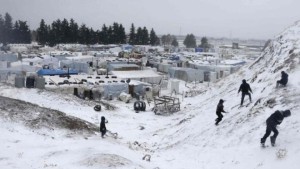But CNN told that observers are “very wrong” to consider key October 10 anniversary as launch date
Researchers from North Korea’s National Aerospace Development Administration (NADA) told a U.S. journalist visiting Pyongyang that a satellite launch is “imminent,” CNN said on Wednesday.
Will Ripley, who is regularly invited to relay messages from Pyongyang to the West, said interviews revealed “final preparations” are currently underway to launch “multiple satellites” into space, something U.S. Secretary of State John Kerry warned last week would lead to “severe consequences.”
“Following the instructions of Marshal Kim Jong Un we scientists here are working very hard, you can’t imagine how hard, to develop in the shortest possible time, multi-functional, highly reliable, Earth observation satellites,” Hyon Gwang Il, NADA’s director of scientific research and development, told CNN.“The satellites we are going to launch imminently are Earth observation satellites. We believe those satellites will be of much benefit to the national economy in general and improving the people’s living standards in particular,” scientist Kim Gun Song.
The specter of another satellite launch, which is viewed by South Korea and the U.S. as cover for sanctioned long-range missile tests, comes following repeated North Korean remarks on the issue throughout the year.
Mark Fitzpatrick, a North Korea watcher at the IISS think tank in London, told NK News that Pyongyang was “trying to build a case that the launch is purely civilian in nature.”
“Inviting in CNN is a good PR move,” he said. “But it won’t convince anybody, because the rocket launches employ technology that is banned by UN resolutions.
“Another crisis is unfolding, with a declared space launch, more sanctions, followed by further North Korean defiance,” he added.
OCTOBER 10 LAUNCH?
But while numerous remarks about satellites have made analysts suspect Pyongyang could use upcoming 70th anniversary of the Workers’ Party of Korea (WKP) celebrations to launch a satellite on October 10, CNN were notably told that no date had been set.
“I think what is very wrong about those people when they try to understand the DPRK’s space program is that they seem to think that we are about to launch a satellite on a particular festival day, on a particular anniversary or on a major holiday,” Hyon said.
“The launch of a satellite itself, it’s a very hard and difficult procedure. It’s a concentration of all important elements of science and technology, especially cutting edge science. This important scientific work is not something at you (sic) must implement on a particular day,” Hyon added.
Hyon’s remarks are consistent with satellite imagery analyzed by North Korea watching site 38 North, which said there was no clear sign of a forthcoming launch at the Sohae Launch Facility, though there have been some advances in construction.
The South Korean Ministry of National Defense (MND) has also said that there have not been any notable changes at the facility, but noted last week that new constructions at the facility had recently been completed.
KEEP THEM GUESSING
Wednesday’s CNN interview comes just a week after state media outlet the Korea Central News Agency (KCNA) published its own interview with the director of NADA, who said the DPRK would launch “a series of satellites of Songun Korea soaring into the sky”.
Christopher Green, a North Korea researcher and PhD candidate at the University of Leiden, said Pyongyang would have invited CNN to the latest interview as “it is the closest thing the United States has to KCNA; a reliably pro-American news agency that is watched reasonably closely in Washington, D.C.
“And the goal? To have CNN listen to — and then report — four members of staff present remarks handed down from the highest levels about the peaceful use of space and the country’s disinterest in using nuclear weapons,” Green said.
Green added that the North Koreans seemed intent on keeping the West guessing as to when a launch might take place.
“The piece is a nice counterpoint to last week’s KCNA article citing the Atomic Energy Agency and saying, “If the U.S. and other hostile forces persistently seek their reckless hostile policy towards the DPRK and behave mischievously, the DPRK is fully ready to cope with them with nuclear weapons any time.” This is strategically smart: nobody can be absolutely certain what Pyongyang’s intentions are,” Green continued.
And in a similar manner, Green said South Korea has been keeping Pyongyang guessing about its policy towards the North.
“Leaving all arguments in favor and against to one side, the fact is that the South Korean authorities are negotiating separated family reunions on the one hand whilst allowing leaflets to be sent across the DMZ on the other,” he said. “As a result … nobody can be absolutely certain what Seoul’s intentions are.”
North Korea successfully launched a satellite in December 2012, using the Unha-3 rocket system. However, previous launch attempts in April 2012, 2008, 2006 and 1998 all resulted in failure.
NADA emerged in March 2013 following a makeover of North Korea’s State Space Development bureau, and was derided by international media for showcasing a logo similar to the NASA space agency in the U.S. last spring.
Andrea Berger, an analyst at UK think-tank RUSI, wrote in NK News last year that the significance of the emergence of the new administration was “more than semantic.”
“The most powerful explanation for the change is that the North Korean leadership intends to design and implement a space development program that requires regular leadership and a more robust support organ … Pyongyang’s message is that its internationally-detested space program is both concrete and expanding.”
Main picture: Korea Pictorial – NK News




